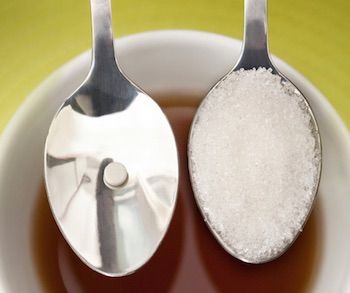Aspartame Turns Into Formaldehyde In The Body And Destroys Your DNA
Last updated on
NutraSweet, Equal, Spoonful, and Equal Measure—these are just some aliases that aspartame, the worst type of artificial sweetener there probably is—goes by.
Aspartame was discovered accidentally in 1965 by G.D. Searle Company chemist James Schlatter while he was testing an anti-ulcer drug. Consisting of three major chemicals—aspartic acid, phenylalanine, and methanol—aspartame is listed under the category of “chemical poison” in the book Prescription for Nutritional Healing, by James and Phyllis Balch. This basically sums up what aspartame truly is.
Originally, aspartame was only approved for dry goods in 1981 and in carbonated drinks in 1983, despite protests from credible individuals, including neuroscience researcher Dr. John W. Olney and consumer attorney James Turner.
Today, aspartame can be found in over 6,000 products, frequently in diet foods and those labeled “sugar-free.”
Here are some shocking examples of aspartame-laden products:
- Breath mints
- Cereals and other instant breakfast meals
- Chewing gum
- Coffee
- Laxatives
- Pasteurized milk
- Soft drinks
- Yogurt
- Pharmaceuticals and supplements, including over-the-counter drugs
Excessive sugar consumption definitely comes with serious health dangers. However, natural health expert Dr. Joseph Mercola strongly believes that substituting natural sugar with toxic artificial sweeteners like aspartame is clearly not the best way to go, as they only do you more harm than good.
Well-Documented Side Effects Of Aspartame
The US Food and Drug Administration has given the green light for aspartame’s safe consumption, disregarding the fact that 85 percent of the overall complaints reported through their agency are adverse reactions to aspartame, including five accounts of death.
Other well-documented side effects of aspartame include:
Headaches/Migraines
- Muscle spasms
- Dizziness
- Seizures
- Nausea
- Numbness
- Irritability
- Heart palpitations
- Tinnitus, or ringing in the ears
- Vertigo
- Breathing difficulties
- Tachycardia, or an abnormally fast resting heart rate
- Vertigo, or the unusual feeling of a spinning or whirling environment
- Anxiety or panic attacks
- Memory loss
- Slurred speech
- Joint pains
- Insomnia
- Vision problems
- Depression
Because of these painful side effects of aspartame, several doctors and researchers conclude that chronic ailments such as brain tumors, diabetes, multiple sclerosis, cancer, Alzheimer’s disease, Parkinson’s disease, epilepsy, and fibromyalgia can be prompted, or worse, further aggravated when you consume this notorious artificial sweetener.
The components of aspartame—aspartic acid, methanol, and phenylalanine—are to blame. The latter has been synthetically altered to carry a methyl group, which is responsible for aspartame’s sweet taste. The phenylalanine methyl bond, called methyl ester, allows the methyl group on the phenylalanine to easily break off and form methanol.
In fruits and vegetables, methanol is bonded to a fiber called pectin that allows it to be safely passed through your digestive tract. However, in aspartame, methanol is not bonded into anything that can help eliminate it from your body. Once inside your body, the methanol is converted by alcohol dehydrogenase (ADH) enzyme into formaldehyde, which can wreak havoc on your DNA and sensitive proteins. All animals, except humans, possess the ability to break down methanol into formic acid.
How to Go Sugar-Free Naturally
Sugar overload, whether natural or artificial, spells total health disaster. Get rid of this sweet villain in your diet and you’ll free yourself from diseases and symptoms you commonly suffer from as well.
Check out these easy and practical steps on how you can go sugar-free the natural way:
- Avoid colored, flavored, and artificial beverages like prepackaged milk, tea, and enhanced water products. You’re better off with fresh, filtered water infused with a slice of vitamin C-rich lemon and basil leaves.
- Use safe natural sweeteners, such as stevia, molasses, or Luo Han. Nevertheless, if you’re struggling with high blood pressure, high cholesterol, any form of diabetes, or obesity, Dr. Mercola advises to steer clear from any form of sugar, even these natural ones, as you likely have insulin sensitivity issues.
- Be vigilant and read the labels consciously. Aspartame and other chemical sweeteners could be lurking anywhere. Make it a habit to read the labels and look for red-flag terms and brand names that may be synonymous to aspartame. Staying away from products that list high-fructose corn syrup as an ingredient is also highly recommended.
Originally published on mercola.com. Republished here with permission.
Some of the links I post on this site are affiliate links. If you go through them to make a purchase, I will earn a small commission (at no additional cost to you). However, note that I’m recommending these products because of their quality and that I have good experience using them, not because of the commission to be made.


 Headaches/Migraines
Headaches/Migraines








 JOIN OVER
JOIN OVER
Comments